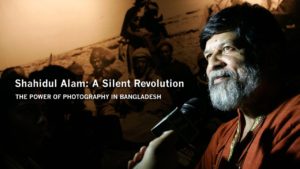
YouTube
The announcement of a schedule for the next general election in Bangladesh has triggered hope of a credible poll but also concern about more political violence across the Muslim-majority South Asian nation, reports suggest.
Some 34 eminent South Asians have written to Prime Minister Sheikh Hasina, demanding the release of civil society activist Shahidul Alam, according to The Wire.
“It is clear to us that the case of Shahidul Alam is being used as a means to suppress criticism by others in civil society,” the signatories said. “His arrest and continued detention appear to be manifestation of an intolerant political atmosphere, an attempt to threaten and silence the voice of Bangladeshi citizens.”
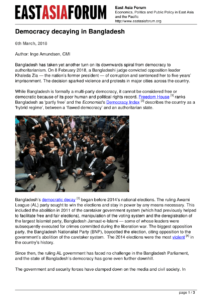 In many ways, Bangladesh is a role model for South Asia. Its economy grew by an average of 6.3% a year over the past decade. Last year it expanded by 7.3%—faster than India’s or Pakistan’s, The Economist notes:
In many ways, Bangladesh is a role model for South Asia. Its economy grew by an average of 6.3% a year over the past decade. Last year it expanded by 7.3%—faster than India’s or Pakistan’s, The Economist notes:
No one, however, would envy Bangladesh’s politics. They are characterised by an all-or-nothing, no-holds-barred aggression between two parties, the ruling Awami League and its main rival, the Bangladesh Nationalist Party (BNP). Disputes are most commonly settled not in parliamentary debate or at the ballot box, but through paralysing hartals—strikes-cum-blockades enforced by partisan thugs. At the most recent election, in 2014, clashes claimed 18 lives on election day alone. More than 100 polling stations were set ablaze.
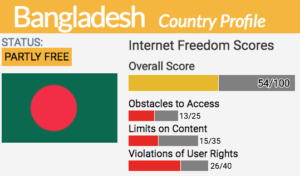 A group of opposition parties in Bangladesh, including the Bangladesh Nationalist Party (BNP), said on Sunday it plans to contest the Dec. 23 general election, despite the ruling party last week rejecting a series of its demands, VOA adds:
A group of opposition parties in Bangladesh, including the Bangladesh Nationalist Party (BNP), said on Sunday it plans to contest the Dec. 23 general election, despite the ruling party last week rejecting a series of its demands, VOA adds:
The Jatiya Oikyafront, a 20-party alliance led by 81-year-old Dr Kamal Hossain, had in particular wanted a caretaker government to take over in the weeks heading into the polls. The BNP says a caretaker government is essential for free and fair elections, but the ruling Awami League says the demand is unconstitutional.
Hasina has an approval rating of more than 68 percent, according to international surveys such as the one conducted this year by the International Republican Institute [a core institute of the National Endowment for Democracy]. 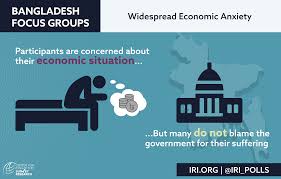 Yet the same survey showed growing concern over the quality of the country’s democratic institutions.
Yet the same survey showed growing concern over the quality of the country’s democratic institutions.
The ruling Awami League (AL) has consolidated political power through sustained harassment of the opposition and those perceived to be allied with it, as well as of critical media and civil society voices, notes Freedom House. Security forces carry out a range of human right abuses with near impunity, while Islamist extremist groups threaten and attack those with dissident views.
While the Awami League has spent much of this and its previous term in power, from 2009 to 2014, focused on suppressing its political rivals in the BNP and allied Jamaat-i-Islami, it has expanded its targets since 2016 to include a liberal and secular civil society, Shehryar Fazli wrote in World Politics Review.
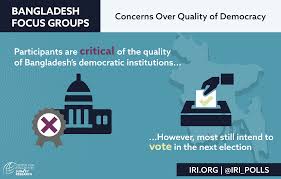 Opposition parties and independent observers fear that the increasing crackdown on privacy and free expression is an attempt to limit speech and criticism of the government in the election period, said Human Rights Watch.
Opposition parties and independent observers fear that the increasing crackdown on privacy and free expression is an attempt to limit speech and criticism of the government in the election period, said Human Rights Watch.
“Bangladesh is using claims about public security to silence opponents and critics,” said Brad Adams, HRW Asia director. “The government’s surveillance practices are violating the rights to privacy and freedom of expression ahead of the elections.”
But the Awami League does not have to rely on ruthlessness. Opinion polls show broad satisfaction with the government, The Economist adds:
A decade of assiduous pampering of police and army officers has bought loyalty, and put paid to fears of coups. The country’s most powerful neighbour, India, tends to support the Awami League. And despite her 71 years Sheikh Hasina is clearly capable of change: ignoring her party’s staunchly secular roots, she has lately outflanked the BNP by winning over the Hefajat-e-Islam, an organisation of arch-conservative clerics. Will these advantages persuade her to let democracy run its natural course, or will she instead keep trying to tame the current?







